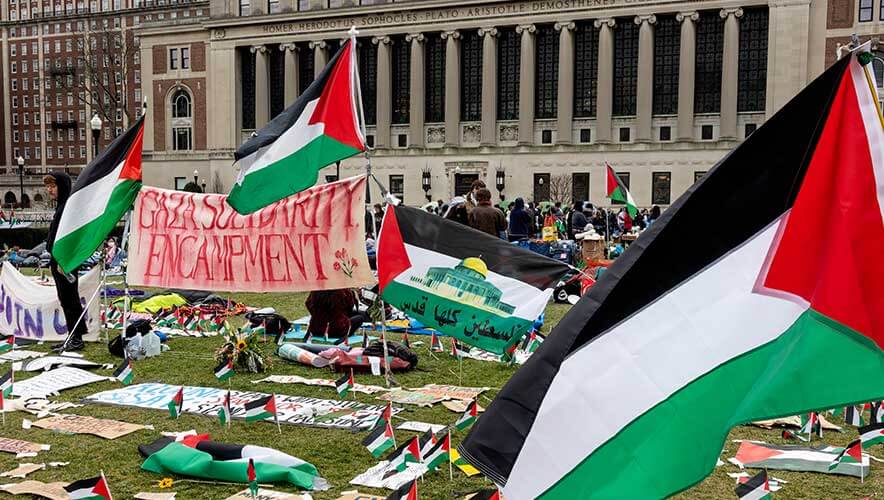Protest Roundup: Encampments, Demonstrations, and Arrests at U.S. Universities
As pro-Palestinian protests on college and university campuses continue, some educational institutions are presenting a more aggressive posture in dealing with the disruptions.
In recent months, U.S. federal investigators and lawmakers have been casting a more critical eye upon institutions of higher education, citing concerns over antisemitism and islamophobia.
Columbia University
Students at Columbia University installed a pro-Palestinian encampment in the middle of the campus.
University President Minouche Shafik invited the New York Police Department (NYPD) to disband the encampment last week. The NYPD arrived in riot gear and arrested more than 100 students. With reports indicating that the protest was peaceful, Shafik’s decision is being scrutinized because the “university’s rules state that police should only be involved as a last resort,” Axios reported.
Tejasri Vijayakumar, student body president for Columbia College, questioned why the NPYD was called in to respond to the peaceful protest instead of the university's public safety department since individuals entering the campus must have a university ID, according to The Washington Post.
Leaders from Columbia University testified in front of Congress on 17 April, indicating that they are less sympathetic to protesters, and agreed that calling for the genocide of Jews would violate its codes of conduct. The testimony was starkly different to the testimony from presidents of the University of Pennsylvania, MIT, and Harvard—two of whom later resigned after receiving backlash and scrutiny.
“Universities have a long tradition of student advocacy and engagement, where viewpoints are tested and difficult debate is encouraged,” said Donna Lieberman, the executive director for the New York chapter of the ACLU, in a press release. “…Columbia’s move to send in police so quickly after these demonstrations began chills student expression, marks a significant departure from past practice, and raises questions about the university’s disparate treatment of students based on their views. It also risks the well-being of students, because the NYPD deployed its Strategic Response Group, a unit that has a history of escalation and violence.”
This escalation must be seen through the lens of the heavy-handed pressure from Congress to clamp down on student protest that criticizes Israel.
— NYCLU (@NYCLU) April 18, 2024
Columbia’s rush to criminalize advocacy flies in the face of its commitment to free expression.
Our statement: pic.twitter.com/XNOefGGQys
Isra Hirsi, daughter of U.S. Representative Ilhan Omar (D-MN), is a student at Colubmia's sister college, Barnard College, and was arrested at Columbia University for helping build and occupy the encampment. Barnard suspended Hirsi, who has “accused Barnard of not providing any food for 48 hours and failing to respond to an email request for meals” after the suspension, according to the National Review.
The protests have widened the opening for Shafik’s critics, with calls for Shafik’s resignation from U.S. Representative Elise Stefanik (R-NY) and a letter from U.S. Representative Virginia Foxx (R-NC), chair of the House Education Committee, warning of “consequences if [university leaders] do not rein in protests on campus,” CNN reported.
Other leaders, including the White House and New York City Mayor Eric Adams, pointed to aspects of the protests, such as signs or other use of language, that were seen as antisemitic. “I am horrified and disgusted with the antisemitism being spewed at and around the Columbia University campus,” ABC News reported Adams saying.
White House Deputy Press Secretary Andrew Bates added that while students have the right to peacefully protest, there was no support for calls for violence or physical intimidation aimed at Jewish students. “Separately, President Joe Biden also denounced ‘blatant antisemitism’ on college campuses, without directly referencing any one university,” BBC News reported.
University officials announced that all classes will be held virtually on 22 April, and are considering offering virtual exams. The decision was made in response to concerns that tensions have continued to rise, with some students using offensive, antisemitic rhetoric.
Despite the disruption, protesters continued to demonstrate on campus for the fifth day in a row on Sunday, 21 April.
Students elsewhere are hosting their own demonstrations in support and solidarity with the students arrested at Columbia. Student encampments formed at Emerson College, MIT, and Tufts University, with students calling on administrators to take action in the Israel-Hamas war.
“These students say they want their school to support all voices, including marginalized ones like theirs,” NBC Boston reported.
Protests, some organized by local chapters of Students for Justice in Palestine, were also reported at Boston University, Ohio State University, and the University of North Carolina, according to Forbes.
By Monday morning, more than 40 pro-Palestinian student protesters were arrested at Yale University. For more than a week, the students have protested the school’s administration and have demanded that the school cease its investments in military weapons manufacturing.
“Yale announced on Wednesday that it would not divest from military weapons manufacturers, a decision that came on the heels of months of pro-divestment campaigning from various students and organizations,” according to the Yale Daily News.
On Friday, more than 400 people gathered at Yale’s Beinecke Plaza for a demonstration held at the same time as the university president’s send-off party. After attempted dialogue during the week between the university and students, the 47 students were arrested on misdemeanor trespassing charges and face potential suspension, according to the Post.
University of Southern California
After the university canceled its valedictorian commencement speech due to safety concerns, students protested against the university and accused it of cowing to anti-Islamic demands.
Asna Tabassum, a first-generation South Asian-American Muslim was to deliver the the speech. Tabassum said the university has not disclosed to her any specific threats to herself or the school that led to its decision to cancel.
Prior to canceling Tabassum’s speech, at least one pro-Israel student group—Trojans for Israel—on campus called for removing her as a commencement speaker.
Tabassum previously posted on a social media account in support of Palestinians and criticiscms of Israel. She posted a link that takes viewers to a slideshow that includes a call for a “one-state solution” and for the “complete abolishment of the state of Israel.” The linked slideshow adds that anti-zionism is not antisemitic. Rather, “anti-zionism is a stance taken by Palestinians, and by non-Palestinians in solidarity with the Palestinian people. …It is also not antisemitic to criticize Israeli policies.”
The University of Southern California (USC) provost, Andrew Guzman, who selects the valedictorian, noted that there was a security threat to the event because of the controversy surrounding Tabassum, according to NPR. Tabassum was initially selected out of approximately 100 eligible applicants.
However, the school’s decision has led to more tension on campus, with Tabassum’s supporters—including free speech groups and the Council on American-Islamic Relations—silently marching on the campus on 18 April in protest of the school’s decision.
In response to the situation, USC decided to cancel all speeches from “outside speakers and honorees,” according to NPR. This means John Chu, a 2003 graduate and director of “Crazy Rich Asians” and “Wicked,” will no longer deliver the ceremony’s keynote speech.
Stanford University
In an effort to shut down its own encampment, which hosted both pro-Palestinian and pro-Israeli tents and supporters, the California university banned overnight camping in February. Stanford said the ban was issued due to concerns about student safety, extreme weather, and rodents.
University of Michigan
The university said it is working on a new policy that addresses punishments for disruptive behavior. The statement came after a pro-Palestinian protest at it convocation.
University of Texas at Austin
On 18 April, university students began protesting the school’s decision to fire more than 60 staff and faculty members who worked in fields relating to diversity, equity, and inclusion (DEI). Roughly 200 students disrupted a virtual faculty council meeting and later participated in a rally on University of Texas at Austin’s campus.
“The layoffs come as the school looks to comply with Senate Bill 17, a law that banned DEI initiatives at public universities in the state that went into effect earlier this year,” The Hill reported.











